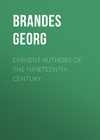Loe raamatut: «Main Currents in Nineteenth Century Literature – 3. The Reaction in France», lehekülg 17
The Romanticists aimed at founding a philosophy and a literature upon want and longing – that is to say, upon the idea of the infinite importance of the individual. The man who bases his philosophy of life upon want is certainly more reasonable than the man who bases it upon either present happiness or the pleasures and bliss of a future existence; for all the happiness we know is undermined by sorrow and by insufficiency, and thus it is on the whole better and safer to build upon want and desire. But the Romanticists do not build upon desire alone, but also upon its satisfaction; they yearn, they wander about in longing quest of the "blue flower," which beckons to them from afar.
Longing, however, is inactivity, is nourished and thrives upon inactivity. He who has left the Romantic philosophy behind him will not base his life upon such a foundation.
Longing engenders the impotent wish. But the Romantic wish is so instinct with genius, that its fulfilment is permitted – in the Romantic world. What desire promises, life fulfils. Fortune comes to the genuine Romantic hero while he sleeps. Romantic literature consequently leaves the simple-minded reader with the impression of a world where everything comes to those who know how to long and to desire ardently enough, where all hindrances are swept aside without labour, without understanding, without trouble.
It is eternally true that we long; and it is no less true that we must build upon something certain. Amidst all the uncertainty, insecurity, and doubt wherewith we are surrounded, there is one thing certain, one thing which cannot be explained away, and that is suffering. And equally certain is the good of the alleviation of suffering and of release from it. It is certain that it is extremely disagreeable to endure pain, to be fettered, or to be imprisoned; and it is equally certain that it is a great relief to be cured, to have one's fetters loosed, one's prison door flung wide open. Hic Rhodus, hic salta! Here is a deed to be done, a stroke to be struck for liberty. We may wander about, full of uncertainty and doubt, not knowing what to believe or what to do; but from the moment we come upon a fellow-being with his fingers jammed in some heavy door that has shut upon them, there is no longer any doubt what we have to do. We must try to open the door and release the hand.
And, fortunately or unfortunately, it so happens that there are always plenty of human beings whose hands are caught fast, plenty who suffer, plenty who sit in all manner of chains – chains of ignorance, of dependence, of stupidity, of slavery. To free these must be the object of our lives. The Romanticist egotistically pursues his personal happiness, and believes himself to be of infinite importance. The child of the new age will neither scan the heavens in search of his star nor the far horizon in search of the "blue flower." Longing is inactivity. He will act. He will understand what Goethe meant by making Wilhelm Meister end his life as a physician.
If it is impossible to found a satisfactory philosophy of life upon longing, it is equally impossible to found upon it a literature which has any connection with life, and which is capable of satisfying in the long run. The task of literature in all ages is to give a condensed representation of the life of a people and an age. Romanticism contemptuously refused this task. Novalis in Germany and Shack Staffeldt in Denmark present the most typical examples of the manner in which it turned its back on outward reality, to create a poetico-philosophic system out of the mind and the poetical longing of the author. It does not represent human life in all its breadth and depth, but the dreams of a few highly intellectual individuals. The cloud-city of Aristophanes, with its air-castles, is the sacred city and goal of its longing.
XIV
ARNIM AND BRENTANO
Herder's Stimmen der Völker ("Voices of the Nations"), published in 1767, contained only twenty German "Volkslieder;" but at the time he brought it out, he expressed the wish that he might live to see the publication of a large collection of the old "Nationallieder," as he called them. In 1806 L. A. von Arnim and Clemens Brentano published the first volume of Des Knaben Wunderhorn; it contained 210 German popular songs and ballads, and was followed in 1808 by two more volumes of about the same size. This book was not only of the greatest historical interest, but was epoch-making in German lyric poetry and German literature generally. It struck that natural note which for many years gave freshness and sonority to both the Romantic and the ante-Romantic lyric poetry. Even when, in the case of Heine, the entirely modern had supplanted the Romantic theme, rhythm and form and many hardly noticeable turns of expression owed their simple charm to the inspiration of the Volkslied. The superiority of German to French lyric poetry in this century possibly lies chiefly in that absence of everything rhetorical which it owes to the influence of Des Knaben Wunderhorn.
Though the two publishers of this great collection were of one accord in their love for the old popular poetry of their country, and also as to the slightly modernised and carefully expurgated form in which the songs were to appear, and though both were thorough-going Romanticists in principle, they were men of very different characters.
Ludwig Achim von Arnim was born in Berlin in 1781. He studied natural science for some time in Göttingen, and then travelled all over Germany, to make himself acquainted with the country and the people and to collect popular songs and ballads. After this he settled for a time in Heidelberg, where he met Clemens Brentano and Görres. In company with them, in 1808, he started a literary periodical, the Einsiedlerzeitung ("Hermit's Chronicle"), amongst the contributors to which were Tieck, Uhland, Hölderlin, and Jacob Grimm. This periodical he continued at a later time under the title Trösteinsamkeit ("Consolation in Solitude").
In 1811 he married Brentano's sister, the famous Bettina, and thenceforward lived partly in Berlin and partly on his estate of Wiepersdorf in Brandenburg. He kept his Romanticism out of his private life; he was a sane, healthy human being, a clever farmer, a sober Protestant and Prussian. Eichendorff describes him as follows: "Handsome and distinguished looking, frank, ardent, and yet gentle, honourable and reliable in all things, faithful to his friends even when every one else deserted them, Arnim was in reality what others, by dint of a sort of mediæval polish, strove to appear – a knightly figure in the best sense of the word; but for this very reason it always seemed to his contemporaries that there was something strange and out of place about him."
Something strange there must certainly have been in his nature, for, staid and sober, calm and harmonious as was his life, his writings give us the impression of restlessness and complexity. He himself was cast in one piece, his works never are.
Besides plays, now unreadable, he wrote two long novels and a number of short tales, which all bear witness to the fantast in him. The epithet "fantast" may be equally suitably applied to Brentano. The first conspicuous difference between the two is, that, whereas Brentano's strength lies in his naïveté and his childlike fancies, Arnim is profoundly serious even in his wildest flights. With all his love for the popular, with all his eagerness to open the eyes of the cultured to the beauty of the simple and childlike, he remained the dignified aristocrat in his own writings; he never let himself go as Brentano did. When his muse has a paroxysm of madness, it is cold, almost severe insanity, not a fiery, merry frenzy, like that to which Brentano's muse is subject.
His power of plastic representation was great, but quickly exhausted. It shows to advantage in some of his short stories, and in some still shorter fragments of his long novels; but along with descriptions and figures which evince real talent, we are presented with a mass of padding – diffuse digressions from the subject, interpolated tales which have little or no connection with the tale proper, fantastic, impossible episodes, against which even the reader with the most undeveloped sense of realism must protest. Sometimes he lays the whole stock of popular superstitions under contribution, treating them with the utmost seriousness – clay figures are magically endowed with life; a mandrake develops into Field-Marshal Cornelius Nepos. At other times he has recourse to the stock-in-trade of the old-fashioned romances – fabulous parentage, recovery of long-lost children, disguises, strange meetings after the lapse of many years. He is also given to introducing ballads and songs, generally under the rather flimsy pretext that they are the composition of one or other of his characters: fluent, but not melodious, they interrupt the course of the action, momentarily attract the attention of the reader, and are immediately forgotten.
Arnim's principal novel with a modern plot, Armuth, Reichthum, Schuld und Busse der Gräfin Dolores: Eine wahre Geschichte zur lehrreichen Unterhaltung armer Fräulein aufgeschrieben ("Poverty, Wealth, Sin, and Penance of Countess Dolores: A True Story, Recorded for the Instruction and Amusement of Poor Young Ladies"), is, taken as a whole, quite as tedious as its title. This novel is another of Wilhelm Meister's progeny. It describes the inner life of gifted and distinguished individuals of very varied character, in very varied circumstances. But there is a smooth, pious strain throughout the whole, which is altogether unlike Wilhelm Meister.
The story opens with a description of a castle which has fallen almost into ruins because of its owner's poverty. This description is striking and good; it has its counterpart in French literature in the picture of the Chateau de la Misère in Th. Gautier's Capitaine Fracasse. We are made to feel all the melancholy associated with the idea of former grandeur and present decay. The somewhat frivolous and selfish character of the penniless young Countess Dolores is also drawn with a masterly hand. This lady succeeds in engaging the affections of a distinguished and rich young man, Count Karl, who falls passionately in love with her and marries her, after overcoming various outward and inward difficulties. In the character of Count Karl, Arnim has succeeded in doing what had perhaps never been done in German literature before, namely, depicting what the English call a perfect gentleman, a conception for which other nations have no corresponding expression. A gentleman is a man of honour, manly, serious, born to command; he is, moreover, a good Christian, conscientious, unselfish, the protector of those around him, not only good by natural disposition, but moral on principle. In this character Arnim seems to have embodied much of what was best in his own nature. Unfortunately he did not succeed in imparting to it sufficient life; a kind of dream-haze surrounds this man of fine feelings, who is always writing verses and who talks a language inspired by the spirit of romance.
The plot turns upon the seduction of the young Countess. She is ensnared by a Spanish duke, who, under a false name and title, gains admission to the house, flatters her vanity in every possible way, and gradually, by the help of magnetism and romantic mysticism, gains complete influence over her, and persuades her that he has some mysterious connection with higher, nay, actually with divine, powers. It seems almost as if Arnim must have had Zacharias Werner in his mind when he drew this character. In Werner's writings we have exactly this same mixture of impudent lust and sanctimonious mystery; and we know that with Werner's mother it became a fixed idea that she was the Virgin Mary and her son the Saviour of the world. We come upon a similar idea in the following somewhat ineffective description of the seduction of Dolores: —
"The Marquis looked up to the sky with an inspired gaze, held up his hands, and appeared to salute some superior being. He said something, but she could not hear what it was, and anxiously asked what he saw. He answered that he saw the blessed Virgin, that she was pressing her, Dolores, to his breast and placing a crown of roses on her head, saying: 'Follow me!' Dolores, startled, went close up to him, imagining that she felt herself pushed towards him; she felt his breath, imagined it to be the divine breath, and cried: 'I feel her, I feel her breath; it is warm as the sun of the East and as a mother's love.' Upon this, exclaiming: 'And I am her son!' he seized her in his arms, trembling convulsively. He had often talked to her before of a wonderful renewal of the holy myth; she seemed almost unconscious as she stammered the words: 'Yes, it is thou, the all-powerful, the most holy – who hast been given to me in the weakness of our human nature.' 'And thou,' he sobbed, 'art my eternal bride.'"
It would almost seem as though it had been Arnim's intention to describe with the aid of these fictitious characters, the mystic-sensual debaucheries of one of his fellow Romanticists, a Werner or a Brentano. He himself was almost the only one of the school who, in spite of the poetic attraction of Catholicism, remained all his life a staunch Protestant. He seems to be attempting to explain exactly that species of piety which mixed itself up with the licentiousness of his Romantic contemporaries when he gives the following diagnosis of the character of the hypnotising seducer: "We are not justified in altogether doubting the piety of this nobleman, which to his truly pious wife seemed so real. He too possessed the religious instinct; and it was Clelia's natural piety which attracted him to her, though the attraction did not last long… Afterwards superstitious fear took possession of him. He had outlived his vices. It was now not merely his religious instinct which impelled him to visit all the places of pilgrimage in Sicily and all the famous priests; he was deluding himself into the piety which in his wife was genuine. It was a new stimulant, the strength of which he was obliged constantly to increase. Religion was to him a kind of opium; his nature craved for more and more of it, till all craving was at an end." (Gräfin Dolores, ii. 136, &c.)
But it is not only the excesses peculiar to the Romanticists which Arnim reprehends; he also sharply and wittily castigates the anti-Romanticist, Jens Baggesen. In Heidelberg, where he must have met Arnim, Baggesen had written a series of satirical sonnets directed against the Romanticists, "literary sansculottes on the German Parnassus," as he called them. These he published in the same year that Dolores appeared, under the title, Der Karfunkel- oder Klingklingel-Almanack, ein Taschenbuch für vollendete Romantiker und angehende Mystiker auf das Jahr der Gnade 1810. It was, however, undoubtedly less Baggesen's verses than his extraordinary instability of character which provoked Arnim's satire. The life of this enemy of Romanticism was more planless and capricious than the life of any one of the Romanticists; and Arnim, for whom everything strange and improbable had an attraction, could not fail to be interested in such a singular personality. In Dolores he caricatures him wittily and mercilessly in the person of the poet "Waller." But though, in this instance, the weaknesses of a special individual are caricatured, Arnim's general purpose unmistakably is to throw into salient relief characteristics which exemplify the lawlessness and levity of the emotional life of a whole generation.
His unfinished historical novel, Die Kronenwächter ("The Guardians of the Crown"), published in 1817, presents us, like Dolores, with several well-conceived and ably elaborated characters along with a mass of undigested mystic and lyric material. In the background of this tale looms a huge, mysterious, enchanted castle, the seven towers of which are absolutely transparent; they appear to be built of glass, for each of them projects a brilliant rainbow upon black rocks and upon distant water. In this castle the guardians of the crown of the Hohenstaufens have their lonely retreat, and hence they sally forth into the world, to act and to avenge. But it is not this mystical background which is of importance. What one really remembers are one or two characters portrayed with such virile force as probably no German author has exhibited since, unless it be Gottfried Keller, in his historical novels.
We have, for example, the hero's foster-mother, Frau Hildegard, to whom we are thus amusingly introduced at the beginning of the book: – "Martin, the new tower watchman, has to-day married his predecessor's widow, because she has grown too stout to come down the narrow corkscrew stair. We really could not pull the tower down for her sake, so she had to make up her mind to this marriage, though she would have preferred our clerk, Berthold. The priest has had to tie the knot up there." This story of the widow's corpulence is of course nonsense, but none the less it makes a very original beginning to the book.
The action passes in the days of Luther, and Luther's figure is seen in the background. It is rare to find a Romanticist writing of him with such warmth as this: – "As a mountain sends out streams to the east and to the west, so this man combined opposites, things that in others are never found together – humility and pride, conviction of the path he was bound to tread and willing acceptance of the advice of others, clear understanding and blind faith."
A prominent part in the action is taken by Dr. Faust, the Faustus of popular legend, the famous doctor and alchemist. He is represented with a fiery red face, white hair, and bald crown, wearing scarlet trunk hose and ten orders. He is half-genius, half-charlatan, and works miraculous cures.
The most beautifully drawn character is that of a woman, the hero's betrothed, Anna Zähringer, daughter of Apollonia, the love of his youth. She is the tall German maiden of powerful build and noble carriage, but she also possesses the sensuous attraction which Gottfried Keller has a special faculty of imparting to his young women. The hero of the story, Berthold, the burgomaster, is another personification of Arnim's personal ideal. He is of noble descent, but having grown up in humble circumstances, is simple and plain in all his ways, a good, upright, quiet citizen. Yet all the time he is at heart an aristocrat, who longs for armour and weapons and tournaments, and who actually, without previous training, wins the prize in the first tournament in which he takes part.
Mystic incidents are, of course, not lacking. If Arnim could not forego them in his modern novel, in which we read of a priest who, with one look, imparted to childless wives the power of conception, they were certain to occur much more frequently, and to be of an even more surprising nature, in a tale of times long past. Faust, for instance, cures Berthold by injecting into his veins some of the blood of a stalwart young man, Anton by name, and ever after this, Berthold has the feeling that Anton has somehow acquired a right of possession in his, Berthold's, lady-love, Anna; and Anton himself immediately feels mysteriously attracted to Anna. Die Kronenwächter, like all Arnim's longer productions, is a piece of patchwork, though it must be allowed that the patchwork does not lack poetic value.
It was only in his short tales that he succeeded in producing the effect of unity. Philander is a clever and pleasing imitation of the style of Moscherosch, a writer who lived in the days of the Thirty Years' War. In Fürst Ganzgott und Sänger Halbgott, we have a humorous variation of the favourite Romantic "Doppelgänger" theme, based upon an extraordinary likeness between two half-brothers who do not know each other; the story is at the same time a travesty of the stiffness and burdensome conventions of small courts. But Arnim's best and most characteristic work is the short tale, Der tolle Invalide auf dem Fort Ratonneau. In it we have all his quaint extravagance, without any breach of the laws of possibility; and the central idea is touchingly human.
The story, like most of Arnim's, has a whimsically grotesque introduction. The old Commandant of Marseilles, Count Durande, is sitting in the evening by his crackling fire, shoving olive branches into the flames with his wooden leg, and dreaming of the construction of new kinds of fireworks, when he suddenly awakens to the fact that his leg is on fire. He shouts for help, and a strange woman, who is in the act of entering the room, rushes up to him and attempts to stifle the flames with her apron; the burning wooden leg sets fire to the apron, but the two are saved by people rushing in from the street with buckets of water. The woman's errand is to present a petition on behalf of her husband, whose behaviour has been peculiar ever since he received a wound in the head. He is a most capable, deserving sergeant, only at times so irritable that it is impossible to get on with him. Partly out of compassion, partly because the case interests him, the Commandant gives this sergeant charge of a fort which only requires a garrison of three men, where, therefore, he runs no great danger of falling out with those about him.
Hardly has he entered the fort before he has an attack of furious madness; he turns out his good wife, refuses to admit his two subordinates, declares war against the Commandant, and opens fire upon Marseilles from his high, inaccessible nest upon the cliffs. For three days he keeps the town in a state of terror. Preparations are made for the storming of the fort, in spite of the certain prospect of loss of life and the fear that the madman may blow up the powder magazine. His brave wife, who loves him, mad as he is, begs that she may first be allowed to try to get into the fort, and, if possible, disarm her husband. He fires upon her, but, led by her love, she climbs undismayed up the narrow rocky path at the top of which two loaded cannons face her. And now, as the result of this terrible excitement, the old wound in the madman's head bursts open again; he comes to his senses, totters to meet his wife – he and she and the town are saved.
The effect of this little work is rather weakened by the introduction of supernatural agencies; the whole calamity, namely, is explained to be the result of a stepmother's foolish curse; still, the story in its simplicity is a glorification of that strong, beautiful love which has power to drive out even the devil himself.
And in this, as in several of his other tales, Arnim evinces a humane sympathy with the lower classes which becomes the aristocratic Romanticist well. It is the same feeling of affection for those who are simple of heart as that which led him to collect and publish the popular songs and ballads, and which finds expression in Dolores in the following words of the hero: "I swear to you that often, when I had to pay a couple of thalers for a few lines containing some utterly superfluous formality, I felt a furious desire to take up the inkpot and knock in the lawyer's teeth with it. I should not have been the least surprised to see a flash of lightning come straight from heaven and burn up all his musty documents. And if I feel thus, how much more grievous must such an outlay seem to the poor man who has perhaps to work a whole week from morning till late at night to scrape the money together." We come on this same idea again in his essay Von Volksliedern, where he declares that the people have come "to look on the law as they look upon a hurricane, or any other superhuman power, against which they must defend themselves, or from which they must hide, or which leaves them nothing to do but despair."
His aristocratic bias is perceptible in all his Romantic vagaries.
With Arnim's name is always coupled that of Clemens Brentano (1778-1849), his partner in the work of collecting and publishing the German popular songs and ballads. Brentano resembles Arnim in his habit of giving free rein to a vivid imagination, but differs from him in being an unstable, unreliable personality. His talent is more sparkling and supple, he is more of an intellectual prodigy; but it is as a psychological phenomenon that he awakens our interest, not as a man. His only claim upon our sympathy is, that he does not, like his spiritual kinsman, Zacharias Werner, degrade himself by sentimental obscenity. He does not act basely, but he is never truthful in the strictest sense of the word, until, intellectually dulled, he renounces the calling of poet, or even of author, and lives entirely for his religious enthusiasms. His case has a certain resemblance to that of Hölderlin, who became insane at such an early age – the last twenty-five years of his life are lost to literature.
In his young days Brentano is the jester of the Romanticists, the wayward knave and wag who cannot refrain from doing what he knows will cost him the friends he has made, nor from disturbing and destroying the emotions and illusions which he himself has skilfully produced. With the quality, rare among the Romanticists, of grace in art, he combines a certain simple pathos. Like many other men of productive intellect, when he took pen in hand he became more profound, more serious, and, above all, more warm-hearted than he was in real life. Hence he not unfrequently as an artist produces the impression of genuineness, though he was insincere as a man.
As an intellectual personality he had no backbone. Destitute of firm convictions, he could only conceive of two attitudes towards the principle of authority in matters of belief – wild revolt or unqualified submission. His intellect oscillated between these two extremes until it found rest in submission.
Of all his gifts and capacities, he, the arch-Romanticist, had only sought to develop that of imagination. Palpably true is the following confession extracted from one of his letters: "Oh, my child! we had nourished nothing but imagination, and it, in return, had half devoured us." Unbridled imagination, developed without any counterbalancing quality, is distinctly akin to mendacity; and, as a matter of fact, Brentano in his youth was an incorrigible liar, whose favourite amusement it was to move ladies to tears by accounts of his entirely imaginary woes.
He was the enfant perdu of the Romantic School. He might also be called the prodigal son of poetry. Like the young man in the New Testament, he was a spendthrift. He squandered all the many good and witty ideas that occurred to him, all the fertile situations which he invented, upon works destitute of definite plan and form, and consequently destitute of the power to withstand time, which so soon sweeps away everything formless. Before he was forty he had exhausted his intellectual capital, had squandered his substance, and was fain, like the young man of the Bible, "to fill his belly with the husks that the swine did eat" – the husks that were the food of only ignorant and superstitious human beings. In other words, he relapsed into foolish bigotry. In the year 1817 he began to go to confession again, as in the days of his earliest youth, and in the following year withdrew from all intercourse with his fellows, to pass the next six years of his life in devout contemplation by the sick-bed of the nun, Catharina Emmerich, who bore on her body the marks of the wounds of Christ. He regarded the bodily infirmities of this pious, single-minded, but perfectly hysterical girl, as so many wonderful signs of grace, believed in the miraculousness of the supposed imprints of the Saviour's wounds, and with awe-strick'en compassion watched them bleed from time to time. Catharina's words convinced him that she possessed a mysterious, supernatural gift of second-sight, and he carefully noted down every one of her visions and hallucinations. He wrote the story of her life, edited her reflections, and wrote to her dictation The Life of the Most Blessed Virgin Mary. After her death, which happened in 1824, practically his only occupation was the preparing for publication of the fourteen volumes of manuscript containing her various utterances.
Brentano's life is a remarkable exemplification of the truth of the words of Mephistopheles in Goethe's Faust: —
"Verachte nur Vernunft und Wissenschaft,
Des Menschen aller höchste Kraft,
Lass nur in Blend- und Zauberwerken
Dich von dem Lügengeist bestärken,
So hab' ich dich schon unbedingt."60
Hallucinations and magic played no small part in his existence, and the man who had begun by sneering at rationalism as dull and barren, fell a prey to ideas far duller and more barren than the emptiest rationalism. He was no more a hypocrite than the good soul, Catharina Emmerich, was an impostor. But the craving for some firm, external support for his weak, wavering Ego, now still farther enfeebled by remorse for the recklessness of his youth, led him to cling with all the fanatical enthusiasm of his soul to the Church and its miracles, just as he had clung in earlier days to poetry with its fairy-tales and magic.
In his later years he was possessed by a kind of religious mania, though on a rare occasion he showed a trace of his old inclination to waggery. He declared, for instance, that he had drawn the apostles who appeared to Catharina Emmerich in her visions exactly as she had described them to him; but Bettina discovered that he had been unable to resist hanging round the apostle Paul's neck, in lieu of a scrip, a curious old tobacco pouch, which had belonged to himself in former days, and about which many funny stories were in circulation among his acquaintances.
On his father's side Clemens Brentano was of Italian descent. His grandfather, a successful Frankfort merchant, was a native of Tremezzo on the Lake of Como. Through his mother he was descended from the authoress Sophie Laroche, Wieland's friend.

















